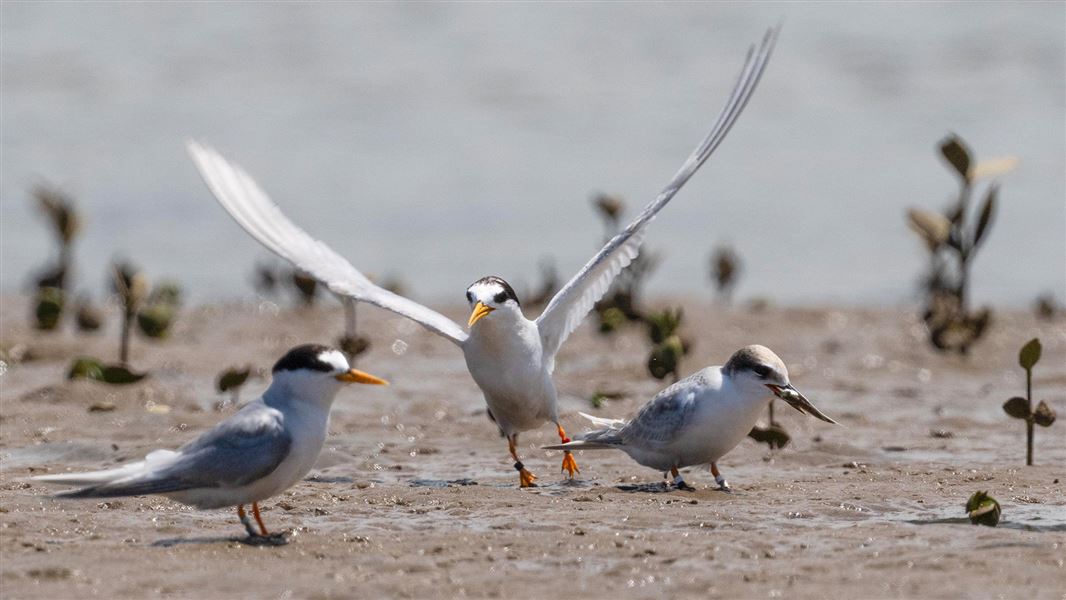Date: 21 February 2024
A total of 22 eggs were laid during the season, resulting in the successful hatching of 18 chicks. 13 birds have already taken flight, marking a significant milestone.
"This season marks a remarkable success story, thanks to the continued refinement of our management strategies, the expansion of our predator control initiatives, and notably, the absence of extreme weather events that have plagued us in recent years," says Alex Wilson, Senior Ranger Biodiversity DOC.
"While 22 eggs may seem typical, what sets this year apart is the higher success rate in chick survival, coupled with the absence of adverse weather conditions experienced in previous seasons."
The hand-rearing of additional birds by Auckland Zoo aims to bolster the wild population numbers in the future.
“Recent successes with hatching and hand-rearing tara iti at the Zoo represent an exciting development in the recovery of this most threatened national taonga,” says Richard Gibson, Auckland Zoo Head of Animal Care and Conservation.
“The option to not only rescue weather-imperilled eggs, but also to proactively increase seasonal chick production through intensive management like this holds great promise for elevating numbers and eventually seeing the tara iti population reach the critical threshold at which they can again become self-sustaining. The Zoo feels greatly privileged to be supporting this recovery initiative in this way, with our aviculturists and veterinarians applying their specialist skills both here at the zoo and on site at the release aviaries in Te Arai.”
"In addition to the favourable weather conditions, we had a new approach to intensive management, where tara iti are hatched and hand-reared at Auckland Zoo before being transferred to a purpose-built aviary within a mammalian predator-proof enclosure," explains Alex.
"Here, the chicks undergo crucial development stages, honing their flying and foraging skills in a natural setting. They gradually integrate with the wild population, exhibiting promising signs of interaction and adaptation."
A dedicated team of tara iti DOC rangers and volunteers works year-round to trap predators, create safe nesting environments, and prevent disturbance near nesting sites.
The tara iti, once widespread, now breeds at only five main nesting sites: Papakānui Spit, Pākiri Beach, Waipū and Mangawhai sandspits, and Te Ārai Stream mouth. DOC collaborates closely with various partners, including Patuharakeke, Ngāti Wai, Ngāti Whātua o Kaipara, Ngāti Manuhiri Settlement Trust, Auckland Zoo, The Shorebirds Trust, The NZ Fairy Tern Charitable Trust, About Tern, Birds NZ, Tara Iti Golf Club, and the Waipū Trapping Group.
Generous support for the tara iti season has been provided by the The Shorebirds Trust, Endangered Species Foundation, Pākiri Beach Holiday Park, Tara Iti Golf Club, Auckland Council, Manāki, Tongariro National Trout Centre, and New Zealand King Salmon.
To support the conservation of tara iti and other shorebirds, the public is encouraged to:
- stay out of fenced areas and use designated walkways
- avoid shorebird nests and chicks
- keep dogs on leads around nesting areas
- remove bait, fish, and rubbish to deter predators
- avoid driving on the beach
- be aware of signs of distress in birds, including squawking or feigned injury, and maintain a safe distance from nests. If a nest is found, do not touch it, as parent birds will be in close proximity.
Contact
For media enquiries contact:
Email: media@doc.govt.nz
